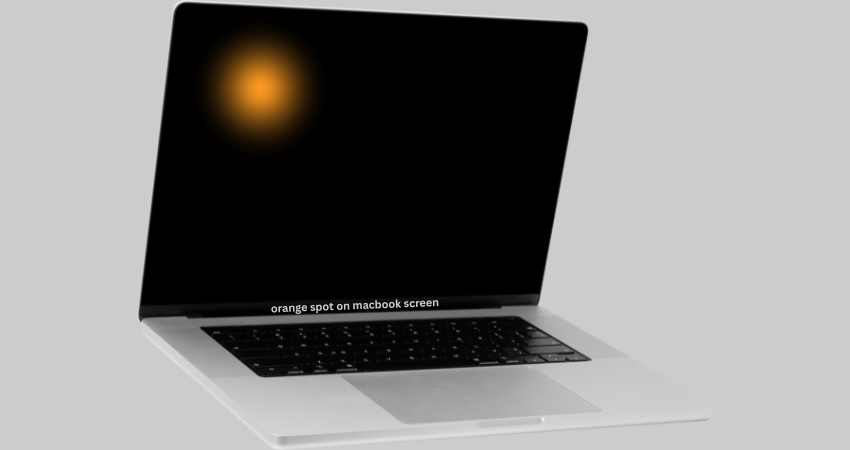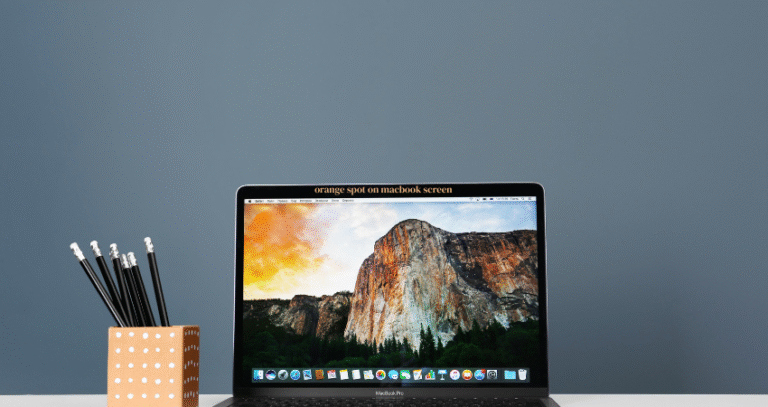Imagine opening your beloved orange spot on macbook screen only to see an annoying orange spot glaring back at you. It’s distracting, frustrating, and downright mysterious. This little blemish can feel like a personal betrayal from your sleek, expensive device. But you’re not alone; orange spots are surprisingly common and can stem from multiple reasons, ranging from hardware glitches to environmental factors.
Why you should care about fixing it
Beyond aesthetics, these spots can gradually impact your screen’s clarity and even your workflow. Whether you’re editing photos, working on graphic design, or just watching your favorite series, color accuracy matters. Ignoring the issue could worsen it over time, possibly leading to more severe screen defects or even complete screen failure. Plus, fixing it now might save you money in the long run.
What Causes Orange Spots on MacBook Screens?
Common hardware-related reasons
One of the main culprits is the dreaded screen delamination, a problem where the anti-reflective coating starts to wear off, especially on Retina MacBooks. Another frequent reason is pressure damage — perhaps from closing the lid with a cable inside or from accidental knocks. Even tiny manufacturing defects can lead to localized discoloration, especially in high-resolution screens that are incredibly sensitive.
Possible software-related triggers
While it’s less common, sometimes software or firmware updates can mess with display calibration, making certain areas appear discolored. Color profiles might become corrupted, or a buggy update might introduce screen artifacts. Although these issues are usually reversible, they can mimic hardware problems and confuse even tech-savvy users.
Environmental and usage factors
Believe it or not, humidity, heat, and even direct sunlight can all contribute to orange spots. If you often use your MacBook in bright light or leave it in a hot car, you increase the risk. Dust and grime build-up under the display layers can also cause discoloration. All these factors combined mean it’s worth being mindful of where and how you use your MacBook.

Identifying the Orange Spot Issue
Signs your MacBook screen is affected
Besides the obvious orange spot, you might notice dim patches, flickering, or weird color shifts. Sometimes, the spot appears more prominent on light backgrounds and fades on dark ones, making it hard to notice until it’s bigger. You might even spot small orange halos around text or images.
Difference between orange spots and other discolorations
Yellow spots often relate to heat damage, while blue or purple marks could indicate liquid exposure or severe pixel failure. Orange usually points to coating issues or pressure damage. Knowing the difference helps you decide whether DIY solutions might work or if it’s time for professional help.
Using diagnostic tools to confirm
Apple Diagnostics (hold D during startup) is a great first step, though it mainly checks hardware. For deeper testing, apps like Display Menu or third-party calibration tools can reveal if the spot is due to pixel issues or color profile problems. Taking high-resolution photos of your screen under different backgrounds can also help you track whether it’s getting worse.
DIY Troubleshooting Techniques
Screen cleaning methods
Always start with the simplest fix. Use a microfiber cloth slightly dampened with distilled water. Never spray cleaner directly onto the screen. Gentle circular motions might reduce visible spots if they’re on the outermost layer. For stubborn marks, specialized screen cleaners can help, but avoid harsh chemicals at all costs.
Adjusting display settings
Sometimes, tweaking brightness, contrast, and color profiles can mask minor discolorations. Go to System Settings > Displays > Color, and experiment with different profiles. Switching to sRGB or Adobe RGB might balance the orange tint. It won’t fix hardware damage, but it can make the spot less noticeable.
Resetting NVRAM and SMC
These resets often fix quirky display behavior:
-
Reset NVRAM: Restart and hold Option + Command + P + R for 20 seconds.
-
Reset SMC (for Intel Macs): Shut down, then hold Shift + Control + Option + Power for 10 seconds.
These resets clear cached settings that might cause screen artifacts. It’s quick, safe, and surprisingly effective in some cases.
Advanced Solutions and Professional Repair
When to seek Apple Support
If the orange spot grows, changes shape, or new spots appear, it’s time to call Apple. Similarly, if your MacBook is still under warranty or has AppleCare+, don’t delay. Trying to fix it yourself could void coverage.
Cost and warranty considerations
Repairs vary wildly depending on your MacBook model. Under AppleCare+, screen replacements might be free or cost around $99. Out of warranty, it could jump to $400–$800. Always check serial numbers and recall lists, as some models (like 2015 Retina orange spot on macbook screen) were eligible for free screen replacements due to known anti-reflective coating issues.
Third-party repair options
Certified repair shops often charge less, but quality varies. Some can replace just the display assembly; others might only clean or polish the anti-glare coating. Always read reviews and ask about warranty on their work. A cheap fix today could cost you more tomorrow if done poorly.
Preventing Orange Spots in the Future
Proper handling and storage tips
Prevention is cheaper—and far less stressful—than repair. First off, always close your MacBook gently, ensuring nothing (like headphones, pens, or even paper clips) is between the screen and keyboard. Even slight pressure can lead to discoloration over time. Avoid stacking items on top of your MacBook, especially heavy books or bags, and never carry it in an overstuffed backpack where pressure points can form.
Another essential habit: keep your MacBook in a protective sleeve or case when you’re on the move. This shields it from bumps, scratches, and sudden pressure. Lastly, keep your MacBook in a cool, dry place. Heat, humidity, and direct sunlight can weaken the screen’s protective layers and accelerate wear.
Screen protectors and accessories
Investing in a high-quality screen protector can work orange spot on macbook screen. Not only does it shield your display from scratches, but it can also add a layer of protection against minor pressure. Matte protectors, in particular, can help diffuse light, making any existing orange spot less noticeable. For those who frequently work outdoors, anti-glare screen protectors reduce reflections and protect against UV exposure.
You might also consider a keyboard cover. When you close the lid, keys can press into the screen, especially if there’s dirt or debris. A thin silicone cover helps distribute the pressure and keeps your display safer.
Regular maintenance routines
Dust and grime can cause or worsen screen spots if they get trapped under the anti-reflective coating. Clean your screen weekly with a microfiber cloth and distilled water. Avoid ammonia-based cleaners—they can damage coatings. Once a month, do a deeper clean, and check for signs of new spots or changes in existing ones.
Also, remember to keep your macOS updated. Some updates fine-tune display performance and may help manage calibration-related discoloration. Think of it as digital housekeeping for your MacBook’s health.
How Orange Spots Affect Screen Performance
Impact on color accuracy
For creatives—photographers, designers, video editors—an orange spot is more than cosmetic. It can throw off your sense of color balance, leading to inaccurate edits. Imagine retouching a photo, only to find later the colors look off on other screens. Even a small spot can trick your eye, shifting your perception of white balance and contrast.
Effect on daily tasks and professional work
Even if you’re not in a creative field, orange spots are distracting. Reading, orange spot on macbook screen videos, or even browsing the web becomes annoying when there’s a constant blemish. Over time, you might subconsciously adjust your posture to avoid looking at the spot, leading to neck strain or eye fatigue. For professionals who use presentations or collaborate onscreen, the spot can also appear unprofessional.
Long-term risks if ignored
Ignoring the issue can lead to more than inconvenience. Screen delamination often worsens, spreading the spot or causing new ones. In severe cases, the underlying LCD might get damaged. What starts as a cosmetic flaw can become a full display replacement costing hundreds of dollars. So it’s wise to act early.

Case Studies and Real-Life Experiences
Stories from MacBook users
Meet Sarah, a graphic designer. She first noticed a faint orange spot on macbook screen circle near the top-left corner of her 2016 MacBook Pro. Thinking it was a smudge, she cleaned it—but it stayed. Weeks later, the spot doubled in size. Sarah shared in an online forum how it affected her design work until she finally sought Apple’s help and got a discounted replacement.
Then there’s David, a software engineer. His orange spot was from closing the lid over an earbud. Though barely noticeable at first, it bothered him during late-night coding. He chose to live with it rather than pay $700 for a new screen, but regrets it now as the spot keeps growing.
Lessons learned
Many MacBook owners learned the same lesson: don’t wait. A small spot might be easy to ignore, but it rarely stays small. Acting early often saves money and protects productivity. Also, investing in simple protection (like screen protectors) can prevent the issue entirely.
Community advice
Online communities recommend:
-
Never use harsh cleaners.
-
Keep your MacBook away from heat and humidity.
-
Close the lid carefully, checking for obstructions.
-
Regularly photograph your screen to track changes.
These small habits add up to a healthier screen and fewer surprises.
Comparing Different MacBook Models
Retina vs non-Retina screens
Retina displays, first introduced in 2012, have stunning resolution but come with a downside: they’re more prone to coating issues. The anti-reflective layer can peel or discolor, causing orange or grayish spots. Non-Retina models, while less sharp, tend to avoid this specific issue.
Older vs newer MacBook generations
Some older MacBook Pros (2012–2015 Retina models) were notorious for “orange spot on macbook screen,” where the anti-reflective coating failed. Apple even launched repair programs for them. Newer models (2016 and onward) improved the coating but didn’t eliminate the problem entirely—though it’s rarer now.
